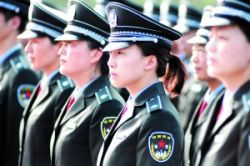Difference between revisions of "Chengguan"
imported>Ciic |
imported>Ciic |
||
| Line 1: | Line 1: | ||
| − | [[File:chengguan.jpg|thumb|250px|Chengguan, law enforcement officials | + | [[File:chengguan.jpg|thumb|250px|Chengguan, local law enforcement officials.]] |
The term '''Chengguan''' ('''城管''') is shortened from the Urban Administrative and Law Enforcement Bureau, a local government agency established in every city in the Chinese mainland, and the law enforcement officials. | The term '''Chengguan''' ('''城管''') is shortened from the Urban Administrative and Law Enforcement Bureau, a local government agency established in every city in the Chinese mainland, and the law enforcement officials. | ||
Latest revision as of 01:45, 26 August 2013
The term Chengguan (城管) is shortened from the Urban Administrative and Law Enforcement Bureau, a local government agency established in every city in the Chinese mainland, and the law enforcement officials.
Based on the Administrative Penalty Law stipulated in 1996 and relative local rules and regulations, these Chengguan are in charge of the enforcement of local urban management bylaw, including maintaining the city appearance and sanitation, work safety, and tackling unlicensed business activities (such as unlicensed street vendors) and random parking. They are also involved in the enforcement of city planning, greening, environmental protection and water saving, as well as other municipal affairs.
In recent years, the clashes between Chengguan and street vendors frequently made headlines across China. The role of the Chengguan has stirred up many heated debates among the public due to several incidents of power abuse by local officials.
In response to the growing public discontent, local authorities from major cities have started to conduct studies and research on new approaches to manage their cities and avoid violent enforcement and confrontations as much as possible.
Taking Wuhan City as an example, on Sept. 2012, a squad of 20 Chengguan stared in silence at illegal vegetable vendors lined up along a road, forcing the vendors to leave out of a sense of embarrassment and fear. While in Nanjing City, a set of new regulations regarding city management took effect on March 1, 2013, stipulating that at least 50 percent of its City Management Committee members should be experts recommended by the public or ordinary volunteers. Once selected, they will serve a three-year-long tenure and help supervise law enforcement and city management.
“We must put people first when managing a city,” said professor Mo Yuchuan from Renmin University, Beijing, who is involved in the stipulation of city management regulations in Nanjing, currently also the first regionally comprehensive city management regulation in China.
